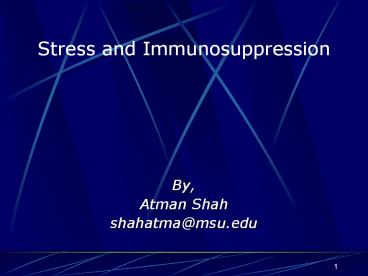Stress and Immunosuppression By, Atman Shah shahatma@msu.edu - PowerPoint PPT Presentation
1 / 25
Title:
Stress and Immunosuppression By, Atman Shah shahatma@msu.edu
Description:
Stress and Immunosuppression By, Atman Shah shahatma_at_msu.edu Stress and Immunosuppression The purpose is to Show that the human immune system is weakened during ... – PowerPoint PPT presentation
Number of Views:46
Avg rating:3.0/5.0
Title: Stress and Immunosuppression By, Atman Shah shahatma@msu.edu
1
Stress and Immunosuppression
- By,
- Atman Shah
- shahatma_at_msu.edu
2
Stress and Immunosuppression
- The purpose is to
- Show that the human immune
- system is weakened during various
- types of stresses
- (2 studies will demonstrate this)
3
Types of Stresses and Examples
- Physical (traffic accident)
- Chemical (drug induced)
- Emotional (depression)
- Acute (short term)
- Chronic (long term)
4
Common Features of All Stresses
- Are to activate 2 neuroendocrine pathways
- 1) Sympathetic Adreno-Medullary (SAM) system.
- 2) Hypothalamic-Pituitary-Adrenal (HPA) axis.
5
Maintain Homeostasis
6
(No Transcript)
7
Adrenaline is produced when we are frightened or
excited. It prepares the body for "fight or
flight."
These preparations include 1.) increasing the
heart rate and blood supply to muscles 2.)
narrowing the arteries that supply the gut.
8
Excessive Cortisol Secretion
9
Cortisol is a key anti-stress hormone.
It helps reduce inflammation during stress, but
it also acts as an immunosuppressent. Various
components of the immune system may be influenced
due to cortisol.
10
Various studies have been done to show the link
between stress and a compromised immune system.
- The studies that follow aim to show how
cellular immunity (which includes phagocytic,
natural killer, and cytotoxic T cells) decreases
as a result of various types of stresses.
11
Stress due to an exam
- Experiment at the Catholic University, in Korea
- 28 male/14 female undergraduate students were
selected and agreed to participate. - They were all free of any disease or illness.
12
Method
- Blood samples were taken on the day of the exam,
and 4 weeks later. - The students blood samples were monitored for
the number of specific immune cells. (macrophages
and other cell derived cytokines)
13
Results
- From the blood samples on the day of the exam,
they found - Lowered levels of Interferon gamma (IFN-?), which
is normally released by T lymphocytes and natural
killer (NK) cells. - Lowered T-helper 1 (Th1) cellular immunity.
14
Results.
From the blood samples they found evidence of
decreased cellular immunity Examination
Day Interferon gamma 190 pg/dl Four Weeks
Later Interferon gamma 500 pg/dl
15
Few Drawbacks
- The experiment had a small sample size (42
people). - The neuroendocrine state (.i.e. HPA axis) was not
examined.
16
Conclusions of this study
- Although the neuroendocrine status was not
monitored, the cytokine profiles were taken which
served as an indirect link to the immune system. - There was a significant decrease in the number of
macrophages, interferons, lymphocytes and natural
killer (NK) cells.
17
Final Conclusion
- Seeing the decline in specific immune cells does
show an inhibited immune system, during stress
due to an exam.
18
Another Study
- The next study will demonstrate what physical and
emotional stresses can do to the immune system
and how it can affect the reactivation of certain
viruses.
19
Space Flight before, during after
- Physical Stresses
- G-force acceleration
- Cosmic radiation
- Pressure variations
- Emotional Stresses
- Accomplishing flight tasks
- Public affair events
- Family time
20
NASA sponsored study..
- To study the relation between elevated stress
hormones and the reactivation of Epstein-Barr
Virus (EBV) in astronauts. - To study the effects of stress due to space
flight on levels of neuroendocrine hormones and
immune cells.
21
Method
- Concentration of (EBV) anti-viral
antigen/antibodies and stress hormones were
measured in blood samples taken from 28
astronauts. - Blood samples were taken
- Ten days before launch
- Landing day
- Three days after landing
- Urine samples for detecting hormones.
22
Results
- There was significant rise (8- to 64-fold
increase) in the levels of EBV antigens in blood
samples taken before, during and after the
flight. (chronic stress, may have triggered the
replication) - The levels of anti-EBV antibodies continued to
decrease from before to after flight. - 11 astronauts showed evidence of EBV
reactivation, and each showed increases in
urinary epinephrine and norepineprine (stress
hormones).
23
Conclusions of this study
- There was a decrease in the virus specific
antibodies in all the astronauts. - Reactivation of EBV occurred in 11 of the 28
astronauts. - Urinary cortisol and catecholamines were
elevated after flight. - Stresses due to space flight lead to decreased
virus specific T-cell immunity and reactivation
of EBV.
24
Final Conclusion
- Both studies showed the effects of different
types of stresses. - Exam stress (acute stress) and space flight
(chronic stress) had similar decline in immune
cells. - The immune system was down regulated in both
studies.
25
The End































